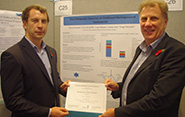The biannual conference, which was held at The Royal Society of Medicine, brought together renowned experts from a range of specialties in the UK and abroad to address the most important issues of the day, including burden of illness, recognition and treatment, vaccine development, vaccine implementation and public health policy, and tackling meningitis in Africa.
Linda Glennie, Head of Research and Medical Information at MRF, said: ‘Our conference attracts delegates from around the world and is a key event in the calendar for some of the foremost scientists and clinicians in the field of meningitis and septicaemia. Tomos’ poster was picked out by the conference steering committee as one of particularly high scientific merit and relevance, with a good quality presentation and a clear message. ‘
Tomos said: ‘I was delighted to win the Meningitis Research Foundation Conference Poster prize. Meningococcal septicaemia is a potentially devastating disease that can result in a variety of disabling complications. This study identified that 7.7% of children who recovered from meningococcal septicaemia in Bristol between 2001 and 2012 left hospital with growth plate damage and/or one or more amputations. The data collected outlined the most common complications and is one of the first to show the impact of growth plate damage as well as amputations. It highlights the vital importance of ongoing monitoring of these children to enable early identification of potentially treatable growth complications.’
